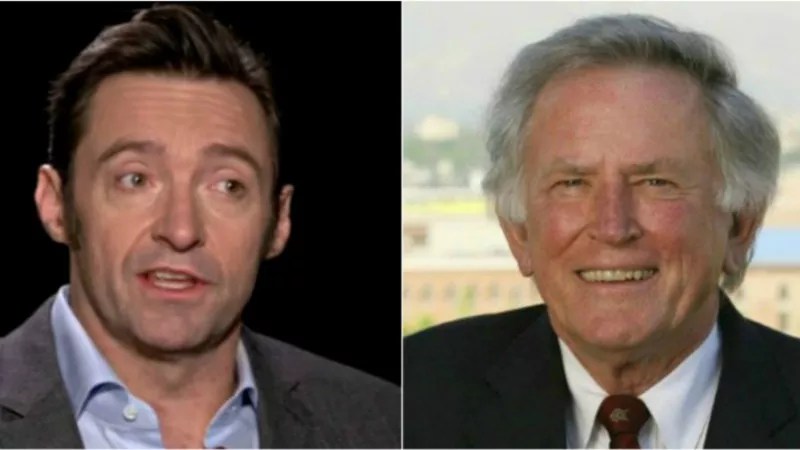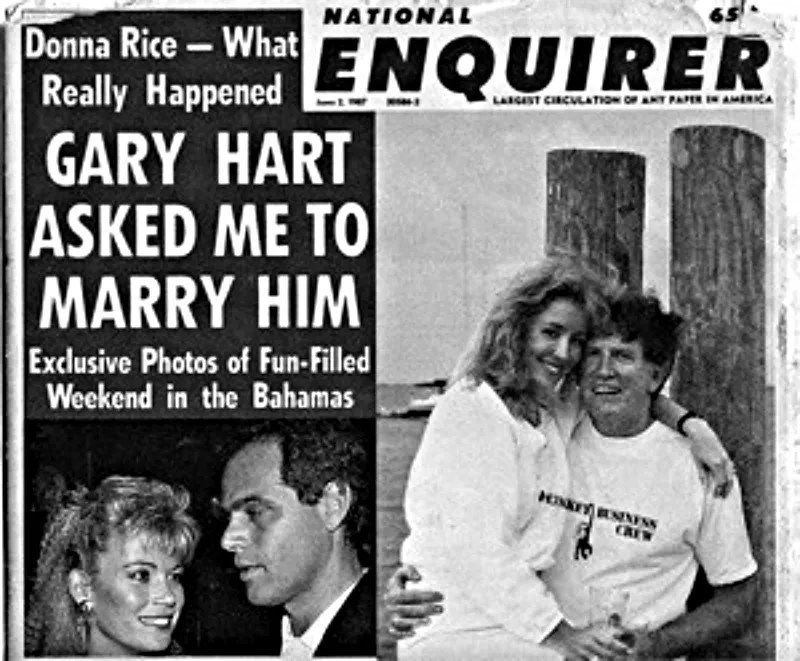
YouTube/File photo

Audio By Carbonatix
Hugh Jackman is reportedly set to play former Colorado Senator Gary Hart in The Frontrunner, a new film by writer-director Jason Reitman. The movie will examine Hart’s 1988 run for the presidency, which imploded after the publication of a photo showing the senator and a model named Donna Rice posing in a friendly manner in front of a boat named the Monkey Business.
According to the Hollywood Reporter, the script for The Frontrunner was penned by Reitman; Jay Carson, a press secretary for Hillary Clinton during her 2008 presidential bid who went on to become a supervising producer for the Netflix series House of Cards; and Matt Bai, a political journalist and author of All the Truth Is Out, a 2014 book about Hart’s journey and the way the Rice revelations torpedoed his chances to become America’s commander and chief.
Reitman may be best known for directing Juno, which won an Academy Award for screenwriter Diablo Cody, but he’s shown an interest in politics from the beginning of his career. His directorial debut was 2006’s Thank You For Smoking, whose protagonist was a lobbyist for the tobacco industry. Jackman, for his part, recently portrayed Wolverine, his iconic X-Men character, for the final time in Logan, and will next appear on the big screen as circus entrepreneur (and Denver neighborhood namesake) P.T. Barnum in The Greatest Showman.
We’ve reached out to Hart in regard to the announcement about the movie and will share his comments if and when he gets back to us. But in a 2008 Westword Q&A, he spoke at length about the 1988 campaign and its legacy in terms of how political candidates are covered in the Tabloid Age. Along the way, he disputed the long-held belief that his downfall was prompted by him responding to rumors about infidelity by challenging reporters to follow him.
Here’s an excerpt from that interview, which demonstrates the richness of the subject matter Jackman and Reitman are planning to explore.

Gary Hart and Donna Rice on the cover of The National Enquirer during the height of the scandal.
File photo
Westword: You earned the 1988 presidential race as the presumed frontrunner before the campaign imploded. What is the legacy of the campaign’s end, especially in the sense of how things that take place in someone’s private life are covered?
Gary Hart: I think that with the Clinton impeachment, the media intrusiveness kind of died down. I think there was the sense that the public believed the media had gone too far in surreptitious surveillance. It’s very dangerous if you’re going to subject candidates to surreptitious surveillance. That’s totalitarian behavior even if it’s done by just one newspaper, as this was done. Looking in people’s windows, going through their trash, following them around surreptitiously is not healthy for the system, and I think enough editors and producers got the message after the Clinton impeachment that they’d better back off and go back to a more normal standard. Now, if somebody shoves a dossier of pictures and so on through the transom at a newspaper, they’re probably going to print it, or at least assign a reporter to check it out. But the phenomenon of the Clinton impeachment is that even though newspapers and magazines were flying off the newsstands and people were totally absorbed in the Lewinski business, his popularity stayed high. So you could only draw the conclusion, even if you were the editor of the New York Times that what people found interesting they didn’t necessarily think was important. It’s always been a staple of journalism that if people read it or listen to it, they think it’s important, and people demonstrated that they didn’t think so. Are people fascinated by a president’s sex life? Yes. Do they think it’s important to his job? Apparently, a lot of them didn’t think so. So I think that caused a real recalibration in newsrooms. Hopefully we’ll go back to the standard where what’s reportable is only what affects a person’s ability to do their job. Anytime the subject comes up, I’m obliged to correct the media myth that I dared or challenged reporters to follow me. I did not. I did not, even though for twenty years I’ve had to live with that allegation. It’s just not true.
There was a New York Times article [written by E.J. Dionne and published on May 3, 1987] that’s generally mentioned as the source of those claims….
It came out the same day as the infamous Miami Herald report [which claimed that a young woman had been seen coming out of Hart’s Washington, D.C. residence the previous night]. They didn’t place me under surveillance as a result of that sentence….
You were already under surveillance.
I was already under surveillance based on rumors, inaccurate rumors. And the sentence in E.J. Dionne’s profile was very much directed to him, and he knows that. I just said, “E.J., you’re welcome to accompany me in my daily rounds if you think I’ve got time to chase girls.” [The quote as published read, “Follow me around. I don’t care… I’m serious. If anybody wants to put a tail on me, go ahead. They’d be very bored.”] He understood it was an invitation. It was to be openly pursued, but I was not stupid enough to dare or challenge the entire press corps. That’s crazy, and everybody in journalism who’s known me for thirty years knows it’s not true. But it was the justification, the after-the-fact justification for supporting the Miami Herald in the media: “Hart dared us to follow him.” I didn’t. I simply didn’t.
The recalibration you talked about… I wonder if there wasn’t a partial recalibration prior to Bill Clinton’s impeachment. In his campaign for the 1992 nomination, questions were raised about his personal life and he managed to survive them. Do you think your experiences in 1988 might have made a lot of people think, we don’t want to eliminate a viable candidate based on something like this?
I think I would substitute “journalist” for “people.” Journalist is a euphemism for people. But yes, I think by ’92, even four years later, there was a sense that all of that business in ’88 hadn’t been handled well by anybody. And even though the myth had settled in that they did what they did because I’d challenged or dared them, there still was a sense that – I wouldn’t say that an injustice had been done, but that the media had gone too far.